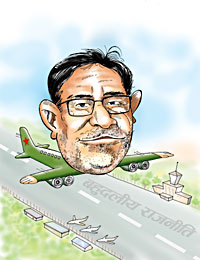The Maoists, like comrades everywhere, have always been big on anniversaries. In past Februaries they blockaded the capital, intensified their shutdowns and alienated the very people they professed to liberate.
This 10th year, Prachanda and Baburam have unleashed a blitzkrieg of interviews from across the southern border. The usually cynical Nepali intelligentsia has been so impressed with the hope of transformation in the strategy of the insurgents that there is a sense of cautious optimism that something somewhere is about to give.  Actually, there is nothing terribly new in the interviews: the comrades haven't renounced violence, they persist in their standard three-point demand and they want the army to be under command of the people. Even with his 'exile or execution' reply to Charles Haviland, Prachanda was just being specific about something his cadre have been saying all along in public meetings across
Actually, there is nothing terribly new in the interviews: the comrades haven't renounced violence, they persist in their standard three-point demand and they want the army to be under command of the people. Even with his 'exile or execution' reply to Charles Haviland, Prachanda was just being specific about something his cadre have been saying all along in public meetings across
the country.
The real question is: what is the strategy behind the interviews? Why now? What now?
Despite his bravado, Prachanda and his cohorts need to be a bit more self-critical. They are blaming everyone except themselves for the destruction of this country over the past 10 years. Foreign interference has intensified, democracy has been dismantled, development is set back decades, the monarchy is more powerful than ever and the comrades are nowhere near victory.
But given the regime's lack of reaction so far, it is obvious the rebels have once more stolen the public relations spotlight. The message has hit home: by putting a face to the revolution the comrades have indicated they want a face-saving way to enter the political mainstream.
It would be natural for the royal regime not to trust the Maoists. But they can be tested and a reciprocal gesture, even if it is just a gesture, would not be construed by anyone as a sign of weakness. By dismissing or ignoring it, the palace-army combine will be sending the message that it in fact wants the war to continue so it can be solely in charge.
The country has seen enough violence, death and destruction over the past decade to ignore even the slightest hint of peace. The bottom-line question for the Nepali people is this: is the need for one man to have more power worth the continued misery and torment of an entire nation?
It is too late for the palace to concede what it could have given two months ago to resolve this. In two months time, no concession may suffice to stay on the saddle. King Richard III had a similar predicament.


